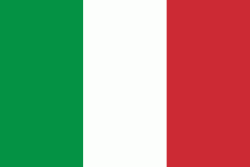Italy (Italia ), officially the Italian Republic, or the Republic of Italy, is a country in Southern and Western Europe. Located in the middle of the Mediterranean Sea, it consists of a peninsula delimited by the Alps and surrounded by several islands; its territory largely coincides with the homonymous geographical region. Italy shares land borders with France, Switzerland, Austria, Slovenia and the enclaved microstates of Vatican City and San Marino. It has a territorial exclave in Switzerland, Campione. Italy covers an area of 301230 km2, with a population of about 60 million. It is the third-most populous member state of the European Union, the sixth-most populous country in Europe, and the tenth-largest country in the continent by land area. Italy's capital and largest city is Rome.
Italy was the native place of many civilizations such as the Italic peoples and the Etruscans, while due to its central geographic location in Southern Europe and the Mediterranean, the country has also historically been home to myriad peoples and cultures, who immigrated to the peninsula throughout history. The Latins, native of central Italy, formed the Roman Kingdom in the 8th century BC, which eventually became a republic with a government of the Senate and the People. The Roman Republic initially conquered and assimilated its neighbours on the Italian peninsula, eventually expanding and conquering a large part of Europe, North Africa and Western Asia. By the first century BC, the Roman Empire emerged as the dominant power in the Mediterranean Basin and became a leading cultural, political and religious centre, inaugurating the Pax Romana, a period of more than 200 years during which Italy's law, technology, economy, art, and literature developed.


















